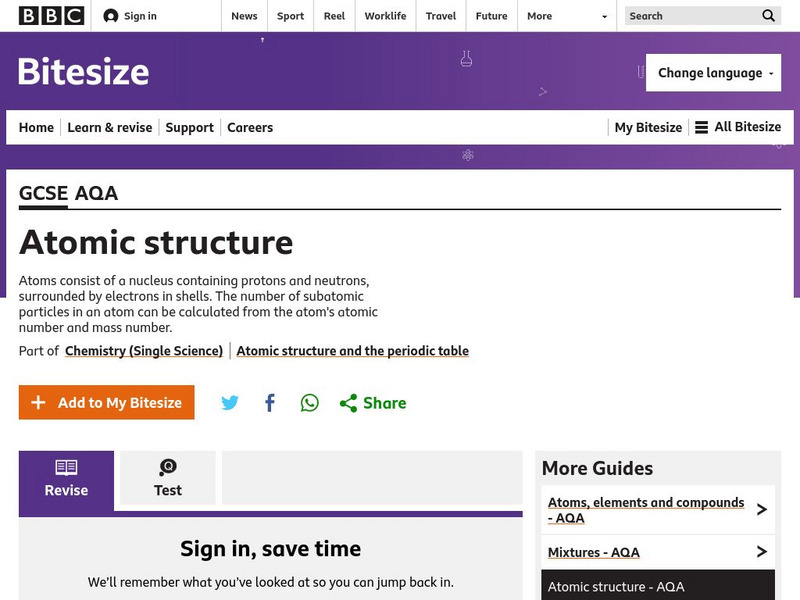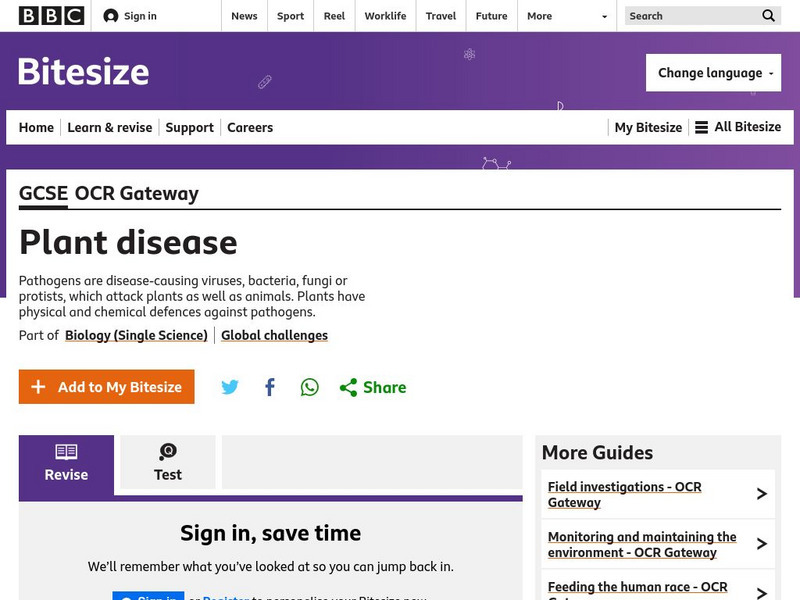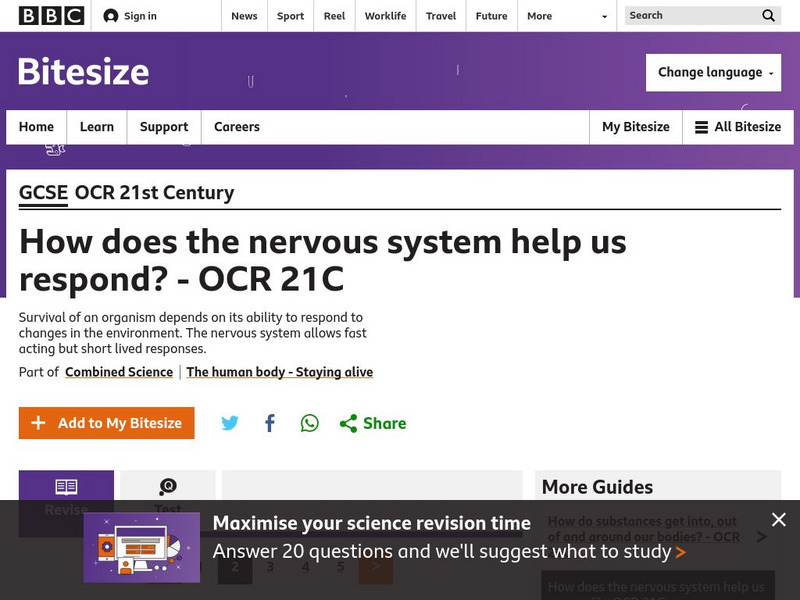BBC
Bbc: Gcse Bitesize: Genetic Inheritance
Mutations can cause a permanent change in the DNA of an organism. Over many generations, organisms have adapted through mutation which involves small changes between organisms which may allow that organism to compete better for survival....
BBC
Bbc: Gcse Bitesize: Adaptations Adaptations, Interdependence and Competition
Organisms depend on each other for survival. This is called interdependence. Both living and non-living factors will affect the abundance and distribution of organisms in a habitat. Included is a link to a test.
BBC
Bbc: Gcse Bitesize: Lenses
Lenses are precisely shaped pieces of glass that have been developed and used in corrective glasses, telescopes, microscopes, binoculars, and magnifying glasses. They can be convex or concave. Links are provided to a video an a test.
BBC
Bbc: Gcse Bitesize: Chemistry (Single Science)
This site lists the topics and lessons available for Chemistry. The topics include Particles; Elements, compounds and mixtures; Chemical reactions, Predicting and identifying reactions and products, organic chemistry, and more.
BBC
Bbc: Gcse Bitesize: Crude Oil, Hydrocarbons and Alkanes
Crude oil is a finite resource. Petrol and other fuels are produced from it using fractional distillation. Cracking is used to convert long alkanes into shorter, more useful hydrocarbons. Links are provided for a video and a test.
BBC
Bbc: Gcse Bitesize: Separation and Purification
There are different ways to separate mixtures, for example by filtration, crystallization, distillation, or chromatography. The method chosen depends upon the type of mixture.
BBC
Bbc: Gcse Bitesize: Genetic Inheritance
This lesson focuses on genetic inheritance including defining key terms such as chromosomes, alleles, DNA, genes, genome, and more. Links to a video and a test are provided.
BBC
Bbc: Gcse Bitesize: Atomic Structure
This lesson focuses on early ideas about the structure of an atom including John Dalton's plum pudding model and Ernest Rutherford's nuclear model. A link to a test is provided.
BBC
Bbc: Gcse Bitesize: Plant Hormones
Plants produce hormones and respond to external stimuli, growing towards sources of water and light, which they need to survive. Read about tropisms and auxins that are used to control growth in plants. There is a quiz at the end.
BBC
Bbc: Gcse Bitesize: Cell Structure Aqa
This lesson focuses on plant cell structures including the parts of cell structures and their functions, cell structures that are in both plants and animals, and the cell structures found only in plants and their functions. Links to a...
BBC
Bbc: Gcse Bitesize: Damage to the Environment
The atmosphere has not always been the same. It has been much the same, but nevertheless now contains more nitrogen and oxygen, and less carbon dioxide, than it did when the earth first formed. Recently, the addition of greenhouse gases...
BBC
Bbc: Gcse Bitesize: The Periodic Table
Elements in the same group in the periodic table have similar chemical properties. This is because their atoms have the same number of electrons in the highest occupied energy level. Group 1 elements are reactive metals called the alkali...
BBC
Bbc: Gcse Bitesize: Why Do Scientists Think That Light and Sound Are Waves?
Light travels as transverse waves and can travel through a vacuum. Sound travels as longitudinal waves and needs to travel through a solid, liquid or gas. Read about the properties of light and of sound, and learn the differences between...
BBC
Bbc: Gcse Bitesize: The Nervous System
An animal's response to a stimulus is coordinated by its central nervous system (CNS). Neurons carry electrical impulses, and are connected by synapses. Some drugs and toxins affect how impulses pass from one neuron to the next across a...
BBC
Bbc: Gcse Bitesize: Radiation Treatment
X-rays, gamma rays and beta particles are all used in medicine to treat internal organs. X-rays are produced by firing electrons at a metal target and gamma rays are emitted by the nucleus of radioactive atoms. Gamma rays are used to...
BBC
Bbc: Gcse Bitesize: Plant Disease
This lesson focuses on plant disease caused by mineral deficiencies including nitrogen and magnesium.
BBC
Bbc: Gcse Bitesize: How Does the Nervous System Help Us Respond? Ocr 21 C
This lesson focuses on the parts and functions of a Neuron, a brief description of how messages flow through them, and a labeled diagram of a motor neuron. It also provides a link to a test.
BBC
Bbc: Gcse Bitesize: Animal Organization Digestion
The major nutrients required for a healthy diet are carbohydrates, proteins, and lipids. The digestive system breaks down large molecules of food, which are then absorbed into the bloodstream. After reading, try the quiz.



















